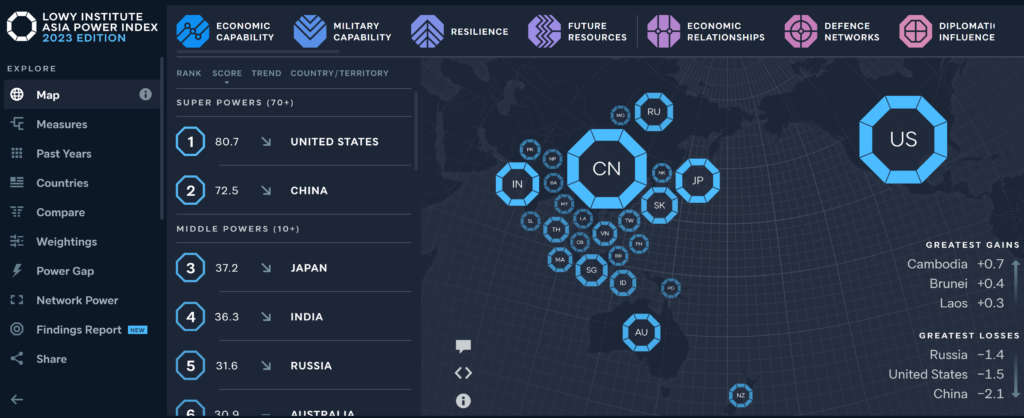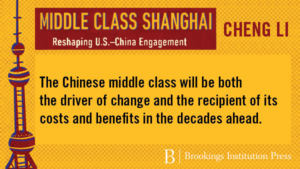 As China goes through a turbulent reopening, some in the United States may take comfort from seeing the country it describes as its most challenging competitor flounder. Yet, China is likely to emerge from its isolation a more potent and formidable competitor for influence. The US will have to adapt its strategy if it is to compete effectively, the Lowy Institute’s Susannah Patton writes.
As China goes through a turbulent reopening, some in the United States may take comfort from seeing the country it describes as its most challenging competitor flounder. Yet, China is likely to emerge from its isolation a more potent and formidable competitor for influence. The US will have to adapt its strategy if it is to compete effectively, the Lowy Institute’s Susannah Patton writes.
The Institute’s Asia Power Index (above), launched on Monday, shows that the US remains the most powerful country in Asia, and leads on six out of eight measures of power. In fact, China has failed to close the gap with the US over the past five years, she adds:

National Endowment for Democracy (NED)
The US is right to prioritise investment in its own national strengths. It will retain a long-term edge over China if it successfully prioritises education, research and innovation in technology, and the resilience of its institutions, including its democracy. Yet, our data calls into question the Biden administration’s heavy reliance on working with allies and partners.
In a severely polarized U.S. Congress, one possible oasis of constructive bipartisanship is the new House Select Committee on China, whose full title refers to “Strategic Competition Between the United States and the Chinese Communist Party,” Robert Kuttner writes for The American Prospect.
The rise of China is not that of an ordinary country, but a country sui generis — a civilizational state, an amalgam of the world’s oldest continuous civilization and a huge modern state, argues Zhang Weiwei (below), the director of the Institute of China Studies at the Shanghai Academy of Social Sciences, and the author of the best-selling book “The China Wave: The Rise of a Civilizational State.” Its rise is a new model of development and a new political discourse that questions many of the Western assumptions about democracy, good governance and human rights.
 The liberal West has long preached universal values beyond national or civilizational boundaries, as if its values were not Western nor European nor Judeo-Christian. Yet, as the Portuguese political scientist Bruno Maçães has argued, “the liberal West” is now dead, having caused “a global rootlessness,” he writes for the Berggruen Institute’s Noema journal:
The liberal West has long preached universal values beyond national or civilizational boundaries, as if its values were not Western nor European nor Judeo-Christian. Yet, as the Portuguese political scientist Bruno Maçães has argued, “the liberal West” is now dead, having caused “a global rootlessness,” he writes for the Berggruen Institute’s Noema journal:
The Chinese approach starts with the dao, or the overall purpose of democracy, is to achieve good governance, and then the shu, which means specific procedures. Chinese believe that the ultimate test of a good political system is not procedural democracy, but to what extent it can achieve good governance or the substance of democracy. I have therefore long advocated for a paradigm shift from “democracy vs. autocracy” to “good governance vs. bad governance,” which suggests we should encourage different political models to compete to see which delivers better governance as judged by their peoples.
 But how can he make such a claim when the Chinese people are denied a voice?
But how can he make such a claim when the Chinese people are denied a voice?
The Brookings Institution hosts a virtual discussion on “Rethinking China’s Rise, Restraints, and Resilience” with Christopher Marquis, professor at the University of Cambridge; Stephen Roach, senior lecturer at Yale University’s School of Management; Susan Shirk, chair of the University of California at San Diego’s 21st Century China Center; Zhao Suisheng, director of the Center for China-U.S. Cooperation; and Diana Fu, nonresident fellow at Brookings. 11 a.m. February 8, 2023. RSVP
Chinese International Relations Professor Zhang Weiwei: Australia Is a Small, Boring Country Whose Economy Is in Decline; It Is Inconsequential When They Talk about China, Ban 5G pic.twitter.com/kF0YYRlifn
— MEMRI (@MEMRIReports) December 2, 2020







